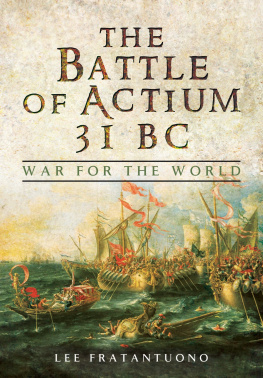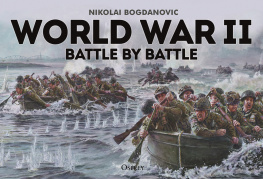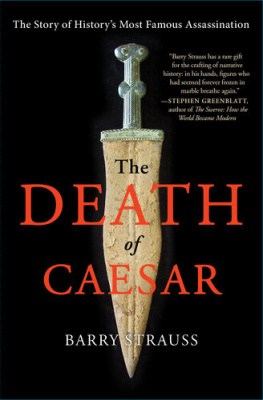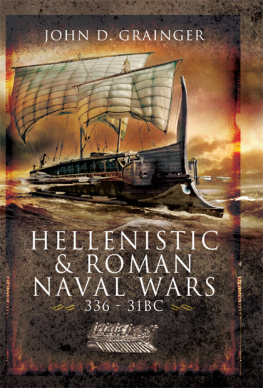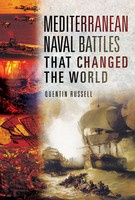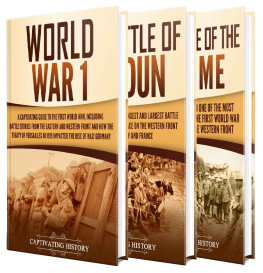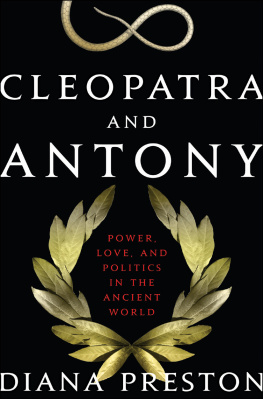Lee Fratantuono - The Battle of Actium 31 BC: War for the World
Here you can read online Lee Fratantuono - The Battle of Actium 31 BC: War for the World full text of the book (entire story) in english for free. Download pdf and epub, get meaning, cover and reviews about this ebook. year: 2016, publisher: Pen and Sword Military, genre: Science. Description of the work, (preface) as well as reviews are available. Best literature library LitArk.com created for fans of good reading and offers a wide selection of genres:
Romance novel
Science fiction
Adventure
Detective
Science
History
Home and family
Prose
Art
Politics
Computer
Non-fiction
Religion
Business
Children
Humor
Choose a favorite category and find really read worthwhile books. Enjoy immersion in the world of imagination, feel the emotions of the characters or learn something new for yourself, make an fascinating discovery.
- Book:The Battle of Actium 31 BC: War for the World
- Author:
- Publisher:Pen and Sword Military
- Genre:
- Year:2016
- Rating:5 / 5
- Favourites:Add to favourites
- Your mark:
- 100
- 1
- 2
- 3
- 4
- 5
The Battle of Actium 31 BC: War for the World: summary, description and annotation
We offer to read an annotation, description, summary or preface (depends on what the author of the book "The Battle of Actium 31 BC: War for the World" wrote himself). If you haven't found the necessary information about the book — write in the comments, we will try to find it.
The Battle of Actium 31 BC: War for the World — read online for free the complete book (whole text) full work
Below is the text of the book, divided by pages. System saving the place of the last page read, allows you to conveniently read the book "The Battle of Actium 31 BC: War for the World" online for free, without having to search again every time where you left off. Put a bookmark, and you can go to the page where you finished reading at any time.
Font size:
Interval:
Bookmark:
The Battle of Actium
31 BC
The Battle of Actium
31 BC
War for the World
Lee Fratantuono

First published in Great Britain in 2016 by
Pen & Sword Military
An imprint of
Pen & Sword Books Ltd
47 Church Street
Barnsley
South Yorkshire
S70 2AS
Copyright Lee Fratantuono, 2016
ISBN 978 1 47384 714 9
eISBN 978 1 47384 715 6
Mobi ISBN 978 1 47384 716 3
The right of Lee Fratantuono to be identified as Author of this work has been asserted by him in accordance with the Copyright, Designs and Patents Act 1988.
A CIP catalogue record for this book is available from the British Library.
All rights reserved. No part of this book may be reproduced or transmitted in any form or by any means, electronic or mechanical including photocopying, recording or by any information storage and retrieval system, without permission from the Publisher in writing.
Pen & Sword Books Ltd incorporates the Imprints of Pen & Sword Aviation, Pen & Sword Family History, Pen & Sword Maritime, Pen & Sword Military, Pen & Sword Discovery, Pen & Sword Politics, Pen & Sword Atlas, Pen & Sword Archaeology, Wharncliffe Local History, Wharncliffe True Crime, Wharncliffe Transport, Pen & Sword Select, Pen & Sword Military Classics, Leo Cooper, The Praetorian Press, Claymore Press, Remember When, Seaforth Publishing and Frontline Publishing.
For a complete list of Pen & Sword titles please contact
PEN & SWORD BOOKS LIMITED
47 Church Street, Barnsley, South Yorkshire, S70 2AS, England
E-mail: enquiries@pen-and-sword.co.uk
Website: www.pen-and-sword.co.uk
Illustration: Northwestern Greece
Illustration: The Battle of Actium, disposition of forces
The present volume is a study of one of the most famous battles in history; the naval engagement of Antony, Cleopatra, and Octavian at Actium. Its aim is to explicate what might well have happened in the waters off northwestern Greece, where the future course of the Roman Republic was charted, and where the lives of three of the most celebrated figures of ancient history converged in one fateful struggle for dominance over the waters of the Mediterranean.
John M. Carters 1970 monograph, The Battle of Actium has a somewhat misleading title, despite its cover illustration of a warship; the subtitle, The Rise and Triumph of Augustus Caesar gives away the books omnibus concern with the entirety of the struggle by which the man history knows best as Augustus came to power in Rome (or restored the Republic, or served as its first citizen, or conquered disorder, etc., etc.). Carters book is a wonderful introduction to a difficult period in Roman history, and the product of careful investigation of the surviving primary historical sources on Actium in particular the full-scale accounts in Plutarchs Life of Antony and Dio Cassius Roman History. As a general primer on a subject of vast and enduring interest, Carters book has worn its years well, and it remains an important guide to the events of the transition from Roman Republic to Empire.
My interest in Actium has romance as its genesis: the twin lures of poetry and cinema, of the poets of Augustan Rome and the cinematic depiction of the battle in Mankiewiczs 1963 Cleopatra, a film that despite its numerous problems of both film quality and historical accuracy, was a contributing factor to my early interest in antiquity. Before long, I was reading numerous studies of Actium out of sheer interest in knowing as much as possible about what happened at the battle, and learning that frustration was a common experience for those who would study the events of 2 September, 31 B.C.E. It seemed unbelievable that so major an event in military history should be so poorly understood, and that so many questions should linger about the events of that September day. Questions such as whether or not Antony and/ or Cleopatra always planned an attempt at escape from entrapment, and just how great a role in the battle was played by Egypts most famous queen seemed surprisingly vexed, especially given the ever expanding bibliography, much of which was derivative of a few of the seminal debates from the early to mid-twentieth century, especially those of Kromayer and Tarn, the main scholarly opponents of the twentieth century on the problem of what happened at the battle.
My study of Actium took a new turn quite unexpectedly, when I commenced a dissertation on Virgils Aeneid. My topic was Book 11, one of the more understudied and unappreciated sections of the epic. In the process of explicating the mysteries of the cavalry battle that is extensively narrated in that book of epic verse, I realized that were significant parallels between Virgils poetic exercise in the description of an equestrian engagement and our surviving evidence for what happened at Actium. More generally, I realized that a close study of the allusions and references to Actium in the poets, Virgil and Horace in particular, were a potential source for serious inquiry into the military situation at Actium. It seemed that the poets of Augustan Rome, notoriously condemned by some as mere propagandists of the victorious regime, deserved to be taken seriously as witnesses and sources of evidence alongside the traditional accounts preserved in the ancient historians. Further investigation into the appearance of Actium in these contemporary works, the earliest literary references to the battle that we possess, seemed to justify the investment of interest and attention. In short, I did not initially approach Virgil with an expectation to find much about Actium other than the celebrated appearance of the battle on Aeneas shield, and the mention of the site of the battle in the course of Aeneas wanderings westward from Troy to Italy. What I discovered about the Virgilian treatment of Actium lore was thus both surprising and unsurprising; Actium emerged as a key event in the unfolding of the depiction of the Virgilian vision of the nature of Augustan Rome.
It is a pleasure then, to turn to Actium as a subject of separate study and investigative research. It is my hope that this book will be of interest to a wide range of possible readers, including both those primarily interested in Roman military and naval history, and those with a particular love for Virgil and his contemporary poets of Augustan Rome. The notes try to blend elements of respect for diverse audiences; those with both more and less knowledge of Roman history, and Latin language and literature, are begged for the indulgence that a book of intentionally diverse aims may require. For ultimately, the desired audience of this work is anyone with a love for the wonder of the study of ancient military history, a field of justly popular interest and enduring appeal. Devotees of Cleopatra may be pleased to find a reading of Egypts queen that concludes that for all her many faults, her military performance at Actium may have been impressive; certainly the Augustan poets were capable of respectful admiration, even as they were willing to criticize the behaviour of both queen and lover.
The plan of the book is to provide commentary and analysis on surviving records and references to the war in ancient literary and historical sources; first the Greek and then the Latin. In the latter case, prose evidence is followed by poetic. Consideration of the evidence is followed by a reconstruction of the battle and some treatment of the question of how certain possible myths and fantasies may have developed in the aftermath of the engagement. A brief afterword considers certain aspects of Roman naval technology and practice, with particular attention to the innovations in strategy and hardware that were implemented by Marcus Vipsanius Agrippa.
Next pageFont size:
Interval:
Bookmark:
Similar books «The Battle of Actium 31 BC: War for the World»
Look at similar books to The Battle of Actium 31 BC: War for the World. We have selected literature similar in name and meaning in the hope of providing readers with more options to find new, interesting, not yet read works.
Discussion, reviews of the book The Battle of Actium 31 BC: War for the World and just readers' own opinions. Leave your comments, write what you think about the work, its meaning or the main characters. Specify what exactly you liked and what you didn't like, and why you think so.

